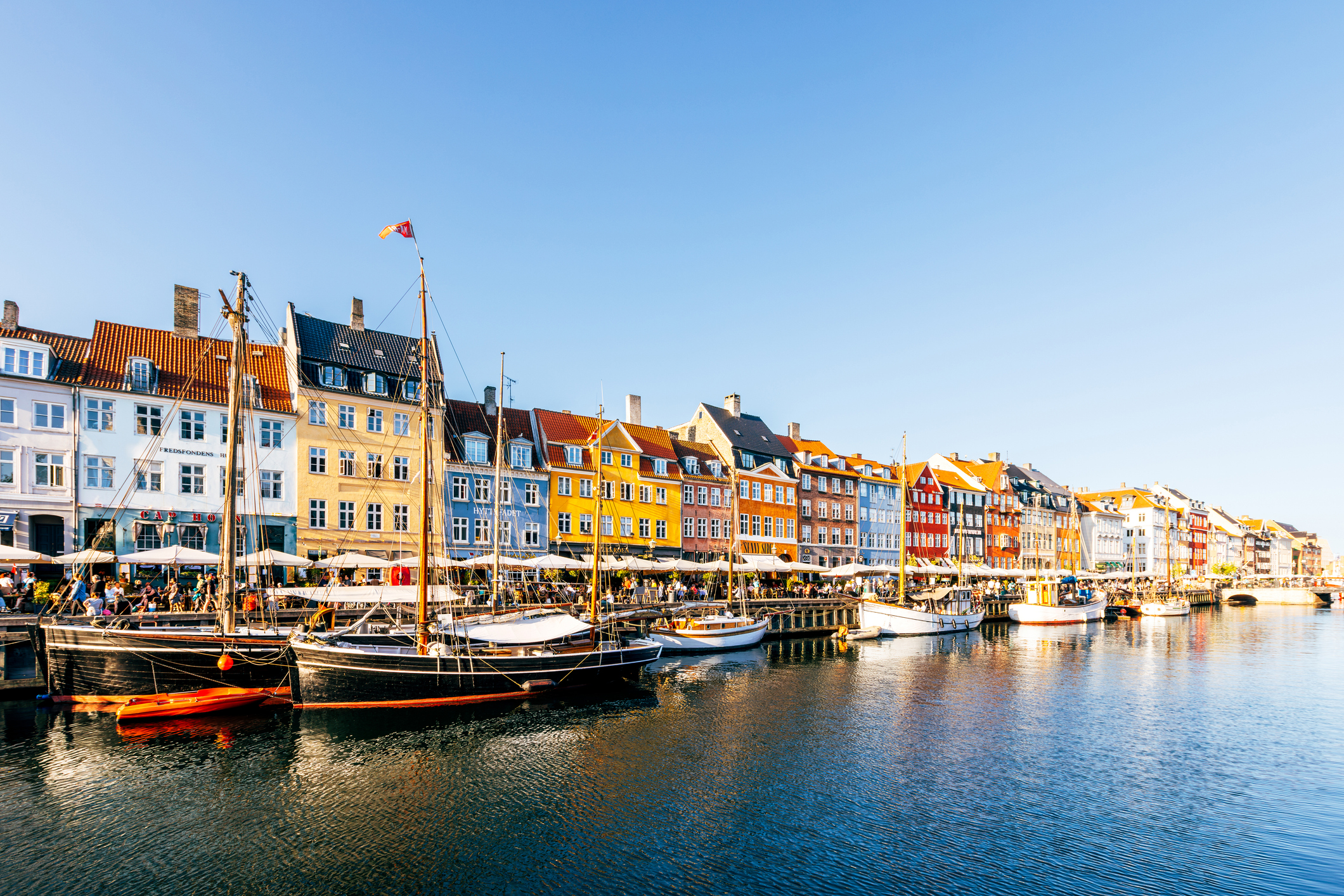Best and worst countries for retirement – where does the UK rank?
Retiring overseas is a great choice for pensioners who want to escape the grey skies of Britain. Which countries are considered top for retirement?

Ruth Emery

Get the latest financial news, insights and expert analysis from our award-winning MoneyWeek team, to help you understand what really matters when it comes to your finances.
You are now subscribed
Your newsletter sign-up was successful
Want to add more newsletters?

Twice daily
MoneyWeek
Get the latest financial news, insights and expert analysis from our award-winning MoneyWeek team, to help you understand what really matters when it comes to your finances.

Four times a week
Look After My Bills
Sign up to our free money-saving newsletter, filled with the latest news and expert advice to help you find the best tips and deals for managing your bills. Start saving today!
Many people dream of retiring abroad, be it for the better weather, a slower pace of life or a cheaper cost of living.
Some are also tempted by brighter economic horizons, better healthcare or a higher quality of life.
They may also look at countries with a cheaper cost of living so that they can buy more with their pension savings abroad.
MoneyWeek
Subscribe to MoneyWeek today and get your first six magazine issues absolutely FREE

Sign up to Money Morning
Don't miss the latest investment and personal finances news, market analysis, plus money-saving tips with our free twice-daily newsletter
Don't miss the latest investment and personal finances news, market analysis, plus money-saving tips with our free twice-daily newsletter
But while some countries may seem ideal in certain aspects, they can also have significant drawbacks, new analysis shows.
A study by asset manager Natixis accounted for myriad factors, analysing healthcare access and cost, quality of life, and finances in retirement, to provide a holistic analysis of each country.
Once each country was scored for these categories, the data was used to provide a final overall ranking.
We look at the best and worst countries to retire in according to Natixis’s data.
Best countries for retirement
Norway
The best country to retire in, according to Natixis’s global retirement index, is Norway with a score of 83%.
The Nordic nation has been one of Natixis’s top three countries to retire in since 2012, including being the best in 2022 and 2023.
The country ranks highly for healthcare, where it is the fourth-best of the countries ranked in the index, scoring 92%. It is also highly rated for quality of life, scoring 88% – the second-highest in the index.
Where Norway does stumble is in finances in retirement, where it is ranked 16th thanks to its relatively high tax burden.

Ireland
The second-best country to retire in, according to Natixis, is Ireland which holds an overall score of 82%.
This is in large part thanks to its strong economic scores, achieving a rating of 76% for finances in retirement, indicating that pensioners have an easier time financially in the country than elsewhere.
Natixis also notes that the country has strong governance, low inflation, and a lower tax burden than other countries on the list.

Switzerland
Ranking as the best country to retire in the 2024 index, Switzerland fell into third spot this year.
The country impresses by ranking in the top ten in all four key indices assessed, indicating that the landlocked nation is a good all-rounder.

Iceland
The second Nordic country in the top five, Iceland was found to be the fourth-best country to retire by Natixis, securing a score of 79%.
Like many other countries in the top five, Iceland scores highly in all four major indices, but has fallen by six places in the material wellbeing category since last year as unemployment has edged higher.
Material wellbeing scores are based on a country’s income equality, income per capita and unemployment rate.

Denmark
Denmark rounds out the top five best countries to retire in, also scoring 79% in Natixis’s rankings.
The reason for its high rank this year is its strong performance in material wellbeing, which has helped it climb four places in the rankings since last year.

The full list of the best countries for UK retirees can be found below. Hoxton rated each country out of ten in ten categories and added the scores to find the best overall.
Worst countries for retirement
India
The worst country to retire in according to Natixis is India, where it received an overall ranking of just 8% – 25 percentage points lower than the second-worst country.
India received poor ratings for health, quality of life, and material well-being.
However, it ranked well in the finances in retirement index, receiving a score of 64 – higher than Germany and Denmark.
Colombia
The second-worst country to retire is Colombia, scoring just 33% overall.
Its low ranking was largely driven by its score of just 7% in the material wellbeing index.
Meanwhile, Colombia scores middling figures in the other three major categories assessed by Natixis, with 55% for health, 55% for quality of life, and 60% for finances in retirement.
Turkey
Turkey was ranked as the third-worst country to retire in Natixis’s rankings, scoring 42% overall. Though this score is much lower than the top five countries to retire, it is still markedly higher than Colombia and India.
Where Turkey struggled was in the quality of life and material wellbeing indices, scoring 33% and 32% respectively.
This being said, the country scores highly for health, achieving 65%, a much higher score than many other countries on the list.
China
Scoring a total of 45%, China was ranked as the fourth-worst country to retire in thanks to its low quality of life scores and relatively low material wellbeing rankings.
Despite its lower scores elsewhere, China does rank relatively highly for finances in retirement, scoring 64% – the same as India and higher than some Western European countries.
Brazil
Finally, the fifth-worst country to retire in is Brazil, which scores a total of 48%, tying it with Spain.
Brazil performs particularly poorly in the material wellbeing index, achieving a score of just 27%, though its other scores rank higher.
Is the UK a good country to retire to?
When looking at the top countries to retire in according to Natixis, you will not find the UK in either the top five, or the top ten. Instead, you will have to look to 14th place to find it.
While the UK does not rank anywhere near as poorly as the bottom-scoring nations like India or Colombia, its score of 72% is markedly lower than those of the best countries to retire.
The UK scores particularly poorly for material wellbeing, achieving a score of just 60%, the second-lowest score in the top 20. This is thanks to the country’s slowing labour market, higher unemployment, and generally weak economic data.
However, where the UK is among the best in a category is in the health index where it scores 88%, tying it in fourth place with Iceland and Denmark.
The best and worst countries to retire in – the full rankings
Rank | Country | Score |
|---|---|---|
1 | Norway | 83% |
2 | Ireland | 82% |
3 | Switzerland | 81% |
4 | Iceland | 79% |
5 | Denmark | 79% |
6 | Netherlands | 79% |
7 | Australia | 77% |
8 | Germany | 76% |
9 | Luxembourg | 75% |
10 | Slovenia | 75% |
11 | Czech Republic | 74% |
12 | New Zealand | 73% |
13 | Singapore | 73% |
14 | United Kingdom | 72% |
15 | Austria | 72% |
16 | Israel | 72% |
17 | Belgium | 71% |
18 | Sweden | 71% |
19 | Malta | 70% |
20 | Canada | 70% |
21 | United States | 70% |
22 | South Korea | 69% |
23 | Finland | 66% |
24 | Slovak Republic | 66% |
25 | Cyprus | 66% |
26 | Japan | 66% |
27 | France | 65% |
28 | Poland | 65% |
29 | Italy | 64% |
30 | Lithuania | 63% |
31 | Portugal | 63% |
32 | Estonia | 61% |
33 | Hungary | 61% |
34 | Latvia | 59% |
35 | Mexico | 54% |
36 | Russia | 53% |
37 | Chile | 52% |
38 | Greece | 51% |
39 | Spain | 48% |
40 | Brazil | 48% |
41 | China | 45% |
42 | Turkey | 42% |
43 | Colombia | 33% |
44 | India | 8% |
Frequently asked questions about pensions and tax when retiring abroad
Federica Grazi, founder of Mitos Relocation Solutions, answers some questions that often crop up when she is helping retirees through the process of moving abroad.
Will my pension be taxed in the UK or abroad?
In most cases, your pension is taxed in the country where you reside more than 183 days a year. So if you move to Greece, Spain, or Italy full-time, that’s where your pension gets taxed.
There is one exception: UK government pensions (e.g. for civil servants, armed forces, NHS, teachers) are typically still taxed in the UK, even if you live abroad (here’s a full list from HMRC).
An important note: Because the UK tax year starts in April, while most other countries follow the calendar year, the timing of the move matters. Planning it carefully can help you avoid being taxed in both countries during the transition period.
How much will my pension be taxed?
This varies hugely by country. Some offer generous incentives for foreign retirees – Greece, southern Italy and Albania, for example – which can slash your tax bill. If no incentives apply, you’ll likely be taxed at local income tax rates, which in some countries are far higher than the UK.
Are state and private pensions taxed the same?
Generally yes, but some incentives apply only if you’ve reached the local retirement age, or your pension includes a state element.
Will I be taxed twice?
Not if there’s a double taxation agreement in place – and the UK has one with nearly every European country. These agreements mean that if you’ve already paid tax on your income in one country, you won’t have to pay it again in the other.
Will my state pension still increase?
Your UK state pension will increase if you retire to an EEA country, Switzerland, or one of the 17 countries the UK has a social security agreement with. It won’t rise each year if you live in certain countries such as Albania or Canada. The Department for Work and Pensions has published the full list on the government website.
What happens with inheritance tax (IHT)?
While many countries have lower inheritance tax than the UK – or none at all – accessing those benefits can be tricky. That’s because UK inheritance tax is based on domicile, a much stickier concept than tax residency. It depends not just on where you live, but where your assets are held, how long you’ve lived abroad, and which ties you’ve maintained with the UK.
Even if you leave permanently, UK inheritance tax can still apply to your worldwide assets for up to 10 years, and sometimes longer. Expert advice is essential.
Can I still take my 25% tax-free pension lump sum after I relocate?
Usually no – you’ll want to do this before changing tax residency.
Besides tax, which other aspects should I consider when moving abroad?
Some recurrent aspects include immigration (UK nationals need a residence permit to move to the rest of Europe after Brexit), healthcare, housing and customs – but it’s important to also consider aspects like lifestyle, community and connectivity.
Get the latest financial news, insights and expert analysis from our award-winning MoneyWeek team, to help you understand what really matters when it comes to your finances.

Daniel is a financial journalist at MoneyWeek, writing about personal finance, economics, property, politics, and investing.
He covers savings, political news and enjoys translating economic data into simple English, and explaining what it means for your wallet.
Daniel joined MoneyWeek in January 2025. He previously worked at The Economist in their Audience team and read history at Emmanuel College, Cambridge, specialising in the history of political thought.
In his free time, he likes reading, walking around Hampstead Heath, and cooking overambitious meals.
- Ruth EmeryContributing editor
-
 Should you buy an active ETF?
Should you buy an active ETF?ETFs are often mischaracterised as passive products, but they can be a convenient way to add active management to your portfolio
-
 Power up your pension before 5 April – easy ways to save before the tax year end
Power up your pension before 5 April – easy ways to save before the tax year endWith the end of the tax year looming, pension savers currently have a window to review and maximise what’s going into their retirement funds – we look at how
